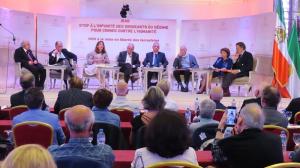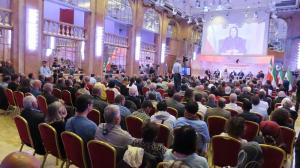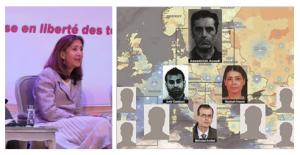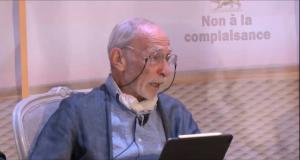(Video) International conference in Paris calls for ending impunity for the Iranian regime

On Saturday, Sep 10, (NCRI) held a conference in Paris to discuss “Impunity for Terrorism and Crimes Against Humanity”.The event took place in light of the United Nations General Assembly, which mullahs President Ebrahim Raisi is planning to attend."

Due to his key role in the mass execution of more than 30,000 political prisoners in the summer of 1988, Raisi is widely dubbed the “butcher of Tehran” and represents a murderous establishment for killing dissidents, protesters as well as ordinary prisoner.

Maryam Rajavi said: “For years, Western gov claimed that they appeased the clerical regime to support the moderates. But, we said from the outset that moderation in the religious dictatorship is a big lie. Now the mullahs have put away the mask of moderat."
The result is impacting the credibility of the fight against terrorism in Europe and the credibility of Belgium in terms of universal competencies.
The event took place in light of the United Nations General Assembly, which the Iranian regime’s President Ebrahim Raisi is planning to attend. Due to his key role in the mass execution of more than 30,000 political prisoners in the summer of 1988, Raisi is widely dubbed the “butcher of Tehran” and represents nothing but a murderous establishment that has killed thousands and dissidents, protesters as well as ordinary prisoners throughout the years.
Another hot debate in Europe is the Tehran-Brussels treaty that may lead to the release of four Iranian state terrorists who are currently behind bars in Belgium for plotting to set off explosives at the 2018 Free Iran World Summit.
Raisi’s planned trip to UNGA and Assadi’s possible return to Iran have evolved into major political debates on both sides of the Atlantic.
During the international conference in Paris, prominent dignitaries and jurists discussed the Iranian regime’s impunity concerning terrorism and crimes against humanity. The participants also offered policy recommendations to the Free World on how to deal with Tehran.
During the international event, the NCRI also showcased the publication of a book in French about the regime’s president Ebrahim Raisi and his career.
Addressing the Paris conference, NCRI President-elect Mrs. Maryam Rajavi said: “For many years, Western governments claimed that they appeased the clerical regime to support the moderates. Of course, we said from the outset that moderation in the ruling religious dictatorship is a big lie. Now the mullahs have put away the mask of moderation. Instead, Khamenei has appointed one of the executioners of the 1988 massacre3 as the regime’s president.”
“And now, this criminal is scheduled to attend the UN General Assembly in New York. It would be a shame for humanity to allow a criminal whose hands are stained with the blood of thousands of innocent prisoners to address the General Assembly.”
“Khamenei appointed Raisi to thwart the advancement of uprisings and the Resistance Units by killing and cracking down on the population. His scheme, however, failed. In recent months, the Iranian people’s protest movement against high prices, unemployment, poverty, water shortages, oppression, and discrimination has continued. The regime has never been so weak but even in this situation, Western governments have granted impunity to the mullahs in various areas.”
“The most recent example is the treaty between Belgium and the Iranian regime to exchange prisoners. Based on this treaty, the Belgian government intends to send a diplomat-terrorist back to Iran. The same man led the plot for the massacre of participants in the Iranian Resistance’s summit in Villepinte, near Paris in 2018. The treaty, whose real objective was the release of this terrorist and was in reality approved to facilitate a disgraceful exchange, amounted to a law that granted impunity to the mullahs’ state-sponsored terrorism.”
“It is time for different nations, especially in Europe and the U.S., to stop turning a blind eye to the regime’s dozens of terrorist activities. The mullahs’ embassies, centers of espionage and terrorism, must be closed. Political and economic relations with this regime must be predicated on a halt in executions and export of terrorism. The Ministry of Intelligence and the IRGC must be designated as terrorists, their agents must be prosecuted and deported, and their European citizenships must be revoked. It is time for the international community to hold the mullahs’ regime accountable.”
Mr. Jean-François Legaret, former Mayor of the 1st District of Paris, moderated the conference. Mr. Legaret elaborated on the program and introduced the panel in his opening statement.
During the program, Mr. Legaret raised questions from the panelists about Iranian resistance, the 1988 massacre of political prisoners, and Raisi’s trip to New York.
Referring to the Iranian state bomb plot targeting the Free Iran Summit in 2018, former Columbian Presidential candidate Ingrid Betancourt said: “Why would the regime want to kill Maryam Rajavi? Why would they send an intelligence agent to bring a bomb to Europe in diplomatic luggage, which is unheard of? Answering these questions would help us understand this regime.”
If you look at the history of Iran and the fight for democracy, there was an Iranian spring after the fall of the Shah, and the people were calling for democracy. But the revolution fell to a regime of terror.
One woman (Maryam Rajavi) has managed to survive against all odds. She saw her own family, her own sister, assassinated. She had the courage to organize a movement in exile, an outstanding organization.
“When you think of the Iranian Resistance, what surprises me is how they maintain the flame alive after so much has happened. Maryam just spoke of the genocide in 1988. Yet this resistance is still in place after all these years. There is one woman who is saying this is not what Islam is about.”
“In Iran, the regime treats women as enemies. They have no rights. And yet this woman is standing strong. It is our duty to support this resistance. When we are here, we are fighting for Iran, for our values, our rights, and our freedom to choose religion and live life as we want. This is what Maryam is about and why she is the number one enemy of the regime.”
“If Belgium accepts this blackmail, it has one prisoner in Iran. France, Germany, UK, all have prisoners in Iran. If we accept this treaty, we will guarantee the impunity of Iranian regime criminals. Then the door will be open for a terrible universal disaster. There will never be enough citizens to pay for all the crimes the regime commits.”
“As a former hostage, I can see what the families of these hostages are going through. These people are in the hands of a state with whom our own democratic states have relationships. We should have no ties with Iran. They should know that there are consequences to terrorism. We should not be weak in the face of terrorism. We should not give criminals impunity. Don’t kneel to the dictatorship of Iran and give them the freedom to continue their terrorism. We can’t accept treaties in which we enable the regime to exchange our citizens with the regime’s murderers.”
Former Algerian Prime Minister Sid Ahmed Ghozali stated: “What is going on in Belgium is a political and legal fight whose outcome will be a turning point in the fight against terrorism in general and Iranian state terrorism in particular.”
The result is impacting the credibility of the fight against terrorism in Europe and the credibility of Belgium in terms of universal competencies.
The government would have signed an agreement with an intention to sign a treaty for exchanging prisoners, and one particular prisoner was condemned by a court of law for attempting to kill several hundred people if his terrorist attack had succeeded.
“Four years ago, the security and justice services of Belgium were able to stop a terrorist attack against a large gathering in Villepinte, which included many European politicians. The Belgian justice system carried out a court case that sentenced the criminal to 20 years in prison.”
“I commend the courage of Belgium. They did a wonderful job of stopping the terrorists and trying them. At the same time, it is that country that this fight is at peril. I don’t want Belgian institutions to confirm this treaty that has been agreed between the Belgian government and the terrorist Iranian regime.”
Professor Eric David, a renowned professor of international criminal law from the Free University of Brussels (ULB), said: “The obligation that Belgium has is to apply the decision of the UN Security Council Resolution, which was adopted after the 9/11 attacks, stating that we must pursue and judge terrorism across the world.”
“We must apply this resolution based on Article 25 of the UN Charter, which states that member states must implement decisions of the UNSC.”
“There was a law that was voted on by the parliament. Article 103 of the UN Charter states that if there is a conflict between the Charter and a treaty, the priority is with the Charter.”
“There are dozens of resolutions from the UNSC that make states responsible to try terrorists and persons who are charged with crimes against humanity.”
“Belgium is bound by a statute that states all members must fight against impunity. And finally, they are responsible for defending human rights.”
“The impunity of a murderer is a violation of the right to life. This is another proof that Assadi and his accomplices should not be returned to Iran, where they will be released.”
French MP Constance le Grip said: “We must continue to mobilize and continue the fight for freedom. As a member of parliament, I’m trying to support this cause and I sincerely hope that there will be changes. There are other committed members in the French parliament who are following what is happening in Iran and want to see freedom come to Iran and the establishment of a government that separates church and state.”
President of the European Law Society Federation from France, Dominique Attias, stated: “We have to know that the 1988 massacre of over 30,000 people, which included women and children, was the first massacre that took place in prison. All those who were killed were prisoners. Some had been there since 1981. All were massacred, hung in rooms, thrown in pits, burned with acid, and all of that without trials. One man, in particular, who is now president of Iran oversaw this crime. This is a nightmare. And the international community, international organizations, and countries are seriously guilty and accomplices as well. Why? Because this bloody butcher, because of the impunity he is given, continued in 2019 with another massacre of hundreds of people who were asking for bread.”
“When we let a terrorist state prosper, when we imagine that this bloody butcher could be welcomed and hosted at the UN, the same person has not said anything when Salman Rushdi was assaulted, when in France, the case of another terrorist started, and when the international community is not saying anything, then we can conclude that the international community is an accomplice.”
“This is why we are here, to support your fight and to say no to impunity. This is for our youth, for our history. This impunity could cause damage. It is imperative that the UN Human Rights Council takes this matter into its hand. The members of the Rome Treaty must ask for an international court to try the perpetrators of this massacre. We must try these perpetrators on our soil. He must be arrested in New York and put on trial.”
Former UNAMI Human Rights Chief Tahar Boumedra stated: “I spent four years in Iraq. I watched closely what the Iranian regime was doing. I was one of the witnesses of what happened in Camp Ashraf. I would like to say this bargaining is taking place in Geneva. I spoke to an authority to discuss the 1988 massacre. When it came to condemning Iran, he said that it is a friendly country, and we can’t condemn them. This is encouraging impunity at the level of the Council in Geneva.”
“We have independent experts, Rapporteurs, people working on human causes who are not being paid by the UN. I’m talking about the workgroup on disappearances, the rapporteur of human rights. The workgroup of executions and disappearances have said that the 1988 massacre will remain an open file until we manage to determine what happened exactly to those prisoners who were executed by the regime.”
“Prof. David covered all the legal aspects. I would like to add there was a convention that was signed in 1987 and ratified by Belgium in 2006. Article 13 of the treaty is in contradiction with the obligations of Belgium in its fight against terrorism with the use of explosives.”
Chairman of ISJ and former Vice President of the European Parliament Dr. Alejo Vidal Quadras stated: “What we’re seeing today is a demonstration of complacency. After two years of investigation, the Belgium justice system sentenced the criminal to the maximum sentence. This means that the Iranian regime organized this terrorist attack. This was the first time that a career diplomat was charged with terrorism in Europe.”
“The situation is concerning because the terrorist regime is going hand in hand with the diplomacy of hostage-taking. The regime is using this method to evade its responsibilities. They arrest western nationals and use them to negotiate with western states.”
“It is not by accident that the regime has arrested Belgian, French, and German citizens in recent months. They want to stock their hostages. We must have a firm policy against Iran to put an end to this inhuman policy.”
NCRI Foreign Affairs Committee Chairman Mohammad Mohaddessin also said: “In the six decades of our organization, we have faced not only one but dozens of massacres. The 1988 massacre was an unprecedented massacre in prison. We are now on the 34th anniversary of this massacre. How has this movement survived?”
“You can hardly find any movement that has been under so much pressure and has survived and continued its struggle for 57 years. This movement has managed with all these difficulties to continue its struggle and expand.”
“If we just look at the past year, we can see that in all fields, the MEK has been successful. In the Free Iran 2022 rally in Ashraf 3, 5,000 Resistance Units members sent videos, in comparison to videos from 1,000 members in the previous year. The Resistance Units have been supporting popular uprisings.”
“To clarify this situation, we must note that the fatwa that Khomeini issued was to destroy all of the People’s Mojahedin Organization of Iran (PMOI / MEK)1. Those who were in prison were just part of the plan. The regime’s current president Raisi said that as long as the MEK exists, every one of them should be executed. This is this regime’s logic. It is clear that this regime wants to create an Islamic empire based on their interpretation of Islam, which is fundamentalist and has nothing to do with the real Islam.”
“In contrast, our organization has a different interpretation of Islam, which embraces modern democracy and society and endorses the separation of religion and state. We are the antithesis of this regime, which is why the regime wants to destroy this organization.”
“But history has shown that [the MEK’s] ideology has not been destroyed through executions. It has grown stronger. Many people were killed by this regime, more than 120,000 of our members and supporters. This is the basis for our popular support.”
Shahin Gobadi
NCRI
+33 6 61 65 32 31
email us here
WATCH NOW: In a crime, the Iranian regime secretly executed over 30,000 political prisoners in 1988. This massacre was implemented following a fatwa by the Khomeini. at http://www.youtube.com/watch?v=yeMqgOly1Fg

1 https://english.mojahedin.org/a-primer-on-the-history-of-the-peoples-mojahedin-organization-of-iran/
2 https://www.ncr-iran.org/en/about-ncri/alternative/
3 https://www.amnesty.org/en/latest/campaigns/2018/10/blood-soaked-secrets/


